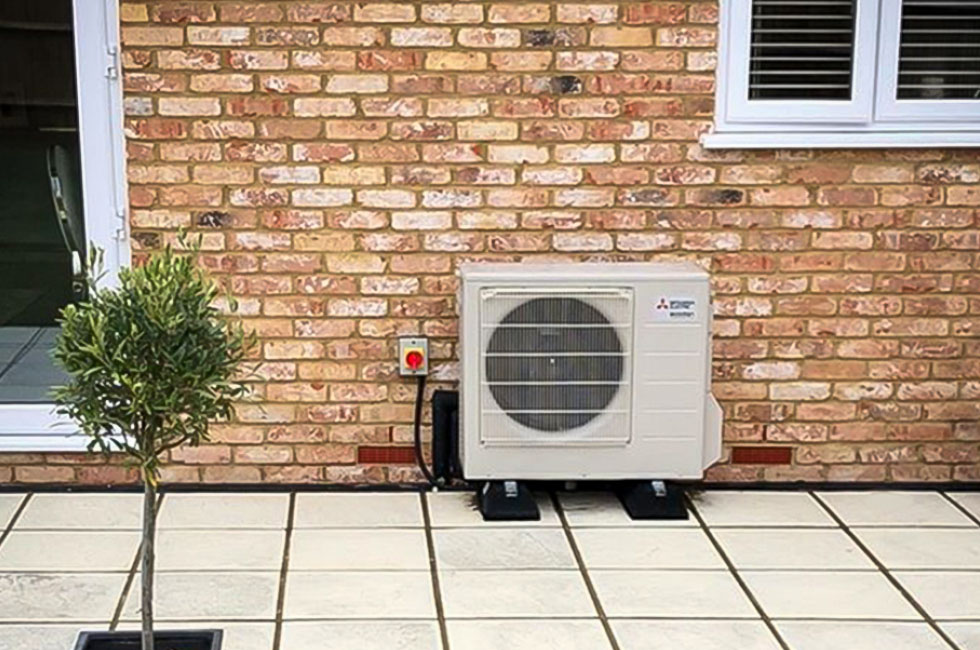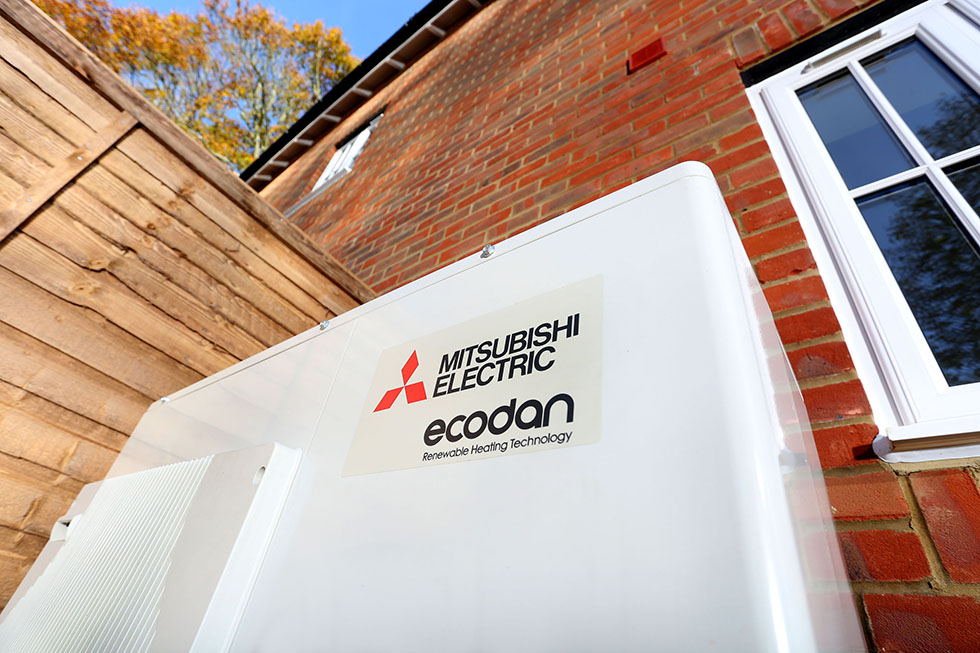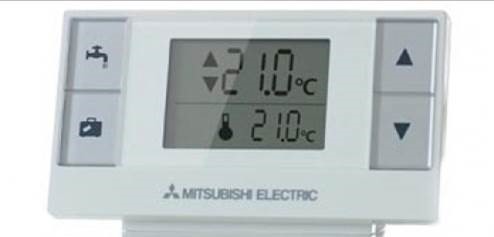Hybrid heat pumps labelled a 'missed opportunity' for decarbonisation
Hybrid heat pumps offer homeowners the chance to "achieve better efficiency, lower carbon emissions, and more reliable heating", as highlighted in new industry white paper

- What are hybrid heat pumps?
- How does a hybrid heat pump work?
- How efficient are hybrid heat pumps and are they worth it?
- How much does it cost to install a hybrid heat pump?
- Running costs for hybrid heat pumps
- Which properties are most suited to hybrid heat pumps?
- Pairing a hybrid heat pump with a hydrogen boiler
- Using a hybrid heat pump with a combi boiler
- Available heat pump systems
- What hybrid heat pump grants are there?
- Are hybrid heat pumps noisy?
Bring your dream home to life with expert advice, how to guides and design inspiration. Sign up for our newsletter and get two free tickets to a Homebuilding & Renovating Show near you.
You are now subscribed
Your newsletter sign-up was successful
Hybrid heat pumps are emerging as a key solution in the journey towards decarbonising home heating systems, combining the benefits of renewable heat pumps with traditional boiler technology.
As the UK pushes for net-zero emissions, hybrid heat pumps present a unique opportunity to improve energy efficiency and reduce carbon footprints while offering flexibility for homeowners.
However, despite their potential, these systems have been labelled a “missed opportunity” in the UK’s decarbonisation strategy, with experts calling for more focused policy and support to encourage widespread adoption.
'Hybrid heat pumps offer a significant opportunity to reduce carbon emissions'
In a recent report, Baxi highlighted the potential benefits of hybrid heat pump systems, calling them a "missed opportunity" for the UK’s transition to clean energy.
The whitepaper, commissioned by Baxi and conducted by Gemserv, delves into the policy landscape surrounding hybrid heat pumps, particularly in terms of their role in accelerating decarbonisation efforts. It identifies key actions that could boost the uptake of these systems, which combine heat pumps with traditional boilers.
Jeff House, External Affairs and Policy Director at Baxi, emphasised that while the government has shown strong ambition to decarbonise heating – through initiatives such as the Warm Homes Plan and the commitment to make Britain a Clean Energy Superpower – hybrid systems have been overlooked in key policies. He stated: "Hybrid heat pumps offer a significant opportunity to reduce carbon emissions while maintaining the flexibility that homeowners need during the transition to cleaner energy."
He argues that these systems, which integrate heat pumps with gas boilers, could play a vital role as a transitional technology, especially in hard-to-decarbonise homes.
Bring your dream home to life with expert advice, how to guides and design inspiration. Sign up for our newsletter and get two free tickets to a Homebuilding & Renovating Show near you.
"By pairing a heat pump with a gas boiler, homeowners can achieve better efficiency, lower carbon emissions, and more reliable heating", House added. "This integration is an essential step for homes that cannot fully decarbonise in the short term but need to reduce their environmental impact."

Jeff has over 25 years of experience in the Building Services sector, including consultancy, design, and contracting. At Baxi Heating, he leads policy and legislative advocacy, with extensive expertise in technical, commercial, and legislative aspects of the residential and commercial building services sector, particularly low and zero carbon technologies.
What are hybrid heat pumps?
A hybrid heat pump can be a single product that is made by a manufacturer, which includes a heat pump and a boiler all in one box.
Alternatively, it can be designed by an installer so it uses your existing boiler, with a heat pump, then engineered into the system to operate at certain times, or according to certain conditions.
The heat pump can be an air source heat pump, which draws its heat from the ambient air around it.
Or, it can be a ground source heat pump, which draws its heat from the ground via a large closed-loop network of pipes, buried horizontally in the ground or placed in vertical boreholes.
How does a hybrid heat pump work?
A hybrid heat pump will change between the two different heat sources according to predetermined settings.
You could choose to have your boiler providing the hot water and the heat pump providing space heating, for example. Or the boiler could be set up to cover both the space heating and hot water demand and the heat pump could be used when the efficiency is higher (and it is cheaper) – it can then be changed over to the boiler when the outside temperature drops.
How efficient are hybrid heat pumps and are they worth it?
A hybrid heat pump system can make your home more energy efficient because it selects a different fuel as and when the efficiency or heat demand changes.
If you're mulling over the question 'Should I swap my boiler for an air source heat pump' or similar, hybrid heat pumps are a viable consideration.
Heat pumps is generally more efficient during the summer, while a boiler is better at managing very low temperatures, although new high temperature heat pumps offer the best of both worlds.
"Given that there are two different heating sources with significantly different heating efficiencies, the overall efficiency can vary depending upon the installation and setup of the controls," advises Marc Overson, Global Product Marketing Manager at mechanical system testers Instron.
product marketing and communications manager for heating at Mitsubishi Electric.
"If you assume that the heat pump has an efficiency of 300% and operates for 80% of the time, the fossil fuel boiler has an efficiency of 90% and operates for the remainder of the time, the overall efficiency would be close to 260%."

Marc has extensive experience with energy efficiency systems. He is currently the Global Product Marketing Manager at Instron. Previously, Marc worked at Mitsubishi Electric Living Environmental Systems UK as the Product & Marketing Communications Manager, managing teams for their heat pump products.
How much does it cost to install a hybrid heat pump?
The cost of fitting a hybrid system can be as much as fitting a heat pump and a boiler, if you are using two separate systems. What you save on shared pipework will be spent on controls and valves.
Some of the pre-manufactured hybrid products range from around £5,000 upwards for the materials, then the installation costs will depend on whether the existing pipework is near the right location or whether significant changes will be required to the pipework and the radiator sizes.
If the heat pump can efficiently deliver a large percentage of the heat load of your home, then the hybrid solution will be good value.

Running costs for hybrid heat pumps
Ultimately, there are many variables with hybrid heat pumps, due to the heat pump market consisting of air source and ground source heat pumps, and the various existing heating fuels such as natural gas, LPG (tank gas), oil or biomass (including logs, wood pellets or wood chips).
All of these fuels will result in different costs to different homes, and as such a hybrid heat pump system must be designed to take into account all of the variables and be able to automatically change as the details change.
The key to a good hybrid heat pump setup is the ability to change the trigger information on a controller. Ideally you need to be able to put in the cost of fuel, CO2 emissions of the fuel and the efficiency of the equipment at different operating temperatures. The controller will then choose which system is the best according to whether you have prioritised running costs or emissions.
Many of these parameters are set up when the system is commissioned but there are some, such as the cost of electricity and the cost of oil or gas, that the homeowner may need to change as the prices fluctuate.
Many heat pumps do not currently stack up financially when compared with the running costs of natural gas (and sometimes even heating oil) and as such it therefore won’t stack up when compared with only covering part of the heat load.
Which properties are most suited to hybrid heat pumps?
Hybrid heat pumps are currently best suited to older properties that may require higher heating system temperatures for some colder days in winter, or perhaps larger properties where the heating demand can change fairly rapidly.
The electricity supply to a larger property may be too small for a heat pump that is large enough to cover the whole annual heating load, so a secondary heat source would cover the shortfall. The boiler simply acts as a backup for the heat pump when demand is high.
In homes where a heating system is already installed it may make a lot of sense to go for a hybrid solution. This way, a large part of the heating demand can be delivered by the heat pump.
Pairing a hybrid heat pump with a hydrogen boiler

The FTC Controller on Mitsubishi’s Ecodan heat pump calls for heat from either heat source, depending on the conditions
As the fuel in the gas network changes to include more hydrogen, we could potentially see the cost of that fuel disproportionately rising.
As this happens, we may then also see the increased benefit of running hybrid systems that allow us to change between different fuel sources and systems, such as hydrogen boilers, as the costs and demands change.
Using a hybrid heat pump with a combi boiler
Hybrid heat pumps can be engineered to supplement new heat pumps using an existing boiler. It could be set up so a boiler provides hot water while the heat pump provides space heating.
"Hybrid heating systems are a great compliment to a Combi boiler and avoid the need for having to find a location for a Hot Water Storage cylinder," says Martyn Bridges, Director of External Affairs at Worcester Bosch.
It could also be set up to cover both and use the heat pump when the efficiency is higher, and then change over to the boiler when the outside temperature drops. this automatic switching of temperatures means you'll likely be able to save on running costs.

Martyn has significant experience in the heating and energy sector, currently serving as Director at Worcester Bosch. Prior to this, he held the position of Director of External Affairs and Director of Technical Services at the company. His expertise spans technical support, marketing, and external relations, which he has developed over his years of leadership in various roles at Worcester Bosch, a renowned manufacturer of heating systems.
Available heat pump systems
Some heat pump manufacturers have digital controllers on the heat pump that are ‘hybrid ready’. This means that the existing (or backup) boiler can be wired to the heat pump controller, and the controller will then call for heat from either of the heat sources depending on how the system is commissioned.
Mitsubishi’s Ecodan heat pumps have this functionality on the FTC 5 and FTC 6 controller, and Grant (Oil boiler manufacturer) also has models that build the heat pump and oil boiler into the same box.
There are even some manufacturers that have built a small heat pump into what is essentially a combi boiler, like the Sime Revolution 30.
What hybrid heat pump grants are there?
Those installing air or ground source heat pumps can benefit from a government grant called the Boiler Upgrade Scheme. Most homeowners will be eligible for a heat pump grant of at least £7,500, but this does not include hybrid systems.
"At present, there are not any grants available for domestic installations of hybrid systems," says Marc Overson.
He added: "The government is taking a very purist approach by not incentivising hybrids. By not offering grants for such installations, it could be preventing existing homes across the UK from accessing efficient, low carbon heat.”
Are hybrid heat pumps noisy?
"A hybrid heating system combines a boiler with an externally sited heat pump, the noise levels of heat pumps for permitted development should all be below 42Dba therefore it is a pretty acceptable noise level, particularly as its external to the property where there is plentiful ambient noise anyway," advises Martyn Bridges.
"A hybrid setup does not affect the noise levels of either system when installed individually," adds Marc Overson. "Most consumers are aware of the noise levels of their gas boiler and heat pumps are also a very quiet technology; with our latest Ecodan models typically emitting noise at a level similar to that of a library – ultra quiet."
Hybrid heat pumps hold great promise in the transition to sustainable home heating. With the right policies and support, these eco heating systems could significantly contribute to lowering carbon emissions and improving energy efficiency across the nation.
By embracing hybrid technology, homeowners can enjoy a smoother and more cost-effective journey towards cleaner energy, ensuring a sustainable future for heating.
David is a renewables and ventilation installer, with over 35 years experience, and is a long-standing contributor to Homebuilding and Renovating magazine. He is a member of the Gas Safe Register, has a Masters degree in Sustainable Architecture, and is an authority in sustainable building and energy efficiency, with extensive knowledge in building fabrics, heat recovery ventilation, renewables, and also conventional heating systems. He is also a speaker at the Homebuilding & Renovating Show.
Passionate about healthy, efficient homes, he is director of Heat and Energy Ltd. He works with architects, builders, self builders and renovators, and designs and project manages the installation of ventilation and heating systems to achieve the most energy efficient and cost effective outcome for every home.

